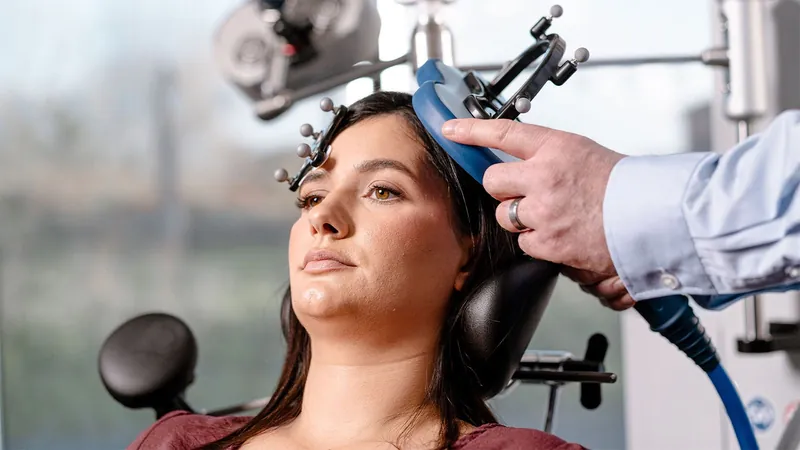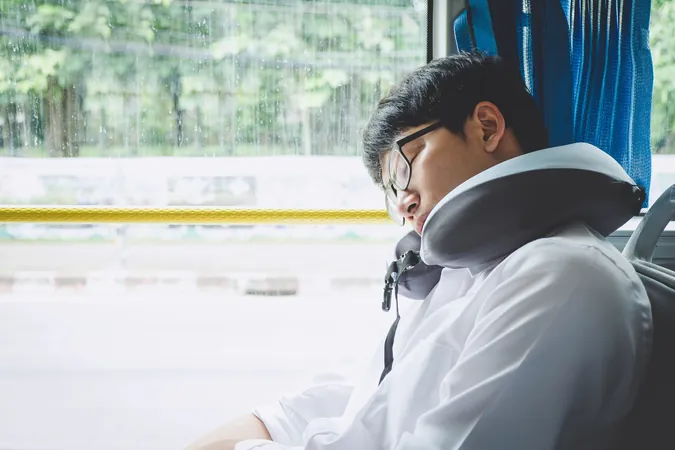
Groundbreaking Study Reveals Magnetic Stimulation as a Promising Treatment for Auditory Hallucinations in Schizophrenia Patients!
2024-11-11
Author: Rajesh
In an exciting breakthrough for schizophrenia treatment, a randomized sham-controlled trial has demonstrated that repetitive transcranial magnetic stimulation (rTMS) can significantly alleviate auditory verbal hallucinations in affected individuals. Researchers from Anhui Medical University in Hefei, China, led by Gong-Jun Ji, PhD, have published their findings in JAMA Network Open, showcasing the potential of this innovative therapy.
The study involved 66 participants exhibiting symptoms of schizophrenia and auditory hallucinations, with 62 completing the 2-week treatment. Participants were split into two groups: one receiving active rTMS (32 individuals) and the other given a sham treatment (30 individuals)— designed to mimic the rTMS experience without delivering any therapeutic electric field. The results were compelling, with those receiving active treatment experiencing a dramatic decline in their symptoms, as indicated by a significant reduction in Auditory Hallucination Rating Scale (AHRS) scores.
At the two-week mark, active rTMS patients showed an impressive average score reduction of 5.96 points compared to the control group (P<0.001), and these benefits persisted into a six-week follow-up, with an even greater difference of 7.89 points between groups (P<0.001). Importantly, the trial reported no severe adverse side effects, underscoring rTMS's safety profile.
Dr. Ji emphasized the critical nature of precise targeting during treatment—leveraging a neuronavigation system for optimal coil placement was key to achieving these favorable outcomes. The study also noted a correlation between the strength of the induced electric field and the reduction of AHRS scores, suggesting that personalized treatment protocols could enhance effectiveness.
Furthermore, secondary analyses revealed significant improvements in Positive and Negative Syndrome Scale (PANSS) scores, which evaluate both positive and negative symptoms of schizophrenia, even though the protocol primarily focused on hallucinations. This suggests that rTMS could have broader therapeutic impacts beyond auditory symptoms.
Dr. Pritham Raj, an associate professor of medicine and psychiatry at Oregon Health & Science University, highlighted the importance of these findings amid a pressing need for alternative treatments for schizophrenia. Given that traditional pharmacological therapies often come with challenging side effects, rTMS offers a promising avenue with minimal adverse effects.
However, the study wasn't without its limitations. Conducted at a single center and featuring a relatively small sample size, the researchers acknowledge the need for extended follow-up to understand the longevity of the benefits. Dr. Raj also raised valid concerns regarding the financial implications of rTMS treatment, stressing the importance of making advanced imaging technologies more accessible to avoid increased treatment costs.
This study is a landmark contribution to schizophrenia treatment strategies. As researchers continue to explore the nuances of rTMS, this therapy could transform how we manage one of psychiatry's most complex disorders. The future of mental health treatment may be brighter, thanks to science and the power of precise magnetic stimulation!
Stay tuned as further research unfolds, potentially unlocking new horizons in mental health therapies!



 Brasil (PT)
Brasil (PT)
 Canada (EN)
Canada (EN)
 Chile (ES)
Chile (ES)
 España (ES)
España (ES)
 France (FR)
France (FR)
 Hong Kong (EN)
Hong Kong (EN)
 Italia (IT)
Italia (IT)
 日本 (JA)
日本 (JA)
 Magyarország (HU)
Magyarország (HU)
 Norge (NO)
Norge (NO)
 Polska (PL)
Polska (PL)
 Schweiz (DE)
Schweiz (DE)
 Singapore (EN)
Singapore (EN)
 Sverige (SV)
Sverige (SV)
 Suomi (FI)
Suomi (FI)
 Türkiye (TR)
Türkiye (TR)